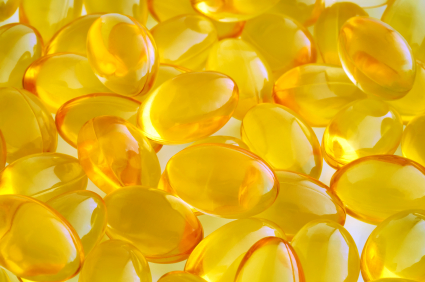NAD Precursor May Improve Cardiovascular Health
 NAD, or nicotinamide adenine dinucleotide, is found in all living cells. Its oxidized form, NAD+, rose in popularity as a nutritional supplement following a 2013 Harvard study that suggested it might slow aging in mice. A 2018 article by researcher Christopher R. Martens and colleagues in the journal Nature Communications reports that a precursor vitamin to NAD+ called nicotinamide riboside (NR) can stimulate NAD+ metabolism in healthy middle-aged and older adults compared to placebo, which might improve cardiovascular health. In the crossover study, participants received NR or placebo for six weeks, and then received the other option for a second six-week period. NR was associated with increased NAD+ metabolism.
NAD, or nicotinamide adenine dinucleotide, is found in all living cells. Its oxidized form, NAD+, rose in popularity as a nutritional supplement following a 2013 Harvard study that suggested it might slow aging in mice. A 2018 article by researcher Christopher R. Martens and colleagues in the journal Nature Communications reports that a precursor vitamin to NAD+ called nicotinamide riboside (NR) can stimulate NAD+ metabolism in healthy middle-aged and older adults compared to placebo, which might improve cardiovascular health. In the crossover study, participants received NR or placebo for six weeks, and then received the other option for a second six-week period. NR was associated with increased NAD+ metabolism.
The researchers suggest that more research is needed to investigate whether chronic NR supplementation might be able to reduce blood pressure and arterial stiffness.
Folate Fortification in Commercial Foods Led to Greater Cortical Thickness
 In 1996, the US began to require that enriched cereal grain products be fortified with folate, a vitamin that is particularly important to fetal brain development. A new study of children born before and after this policy change suggests that the increased folate in commercial foods after 1996 led to increases in cortical thickness in the children born after the change.
In 1996, the US began to require that enriched cereal grain products be fortified with folate, a vitamin that is particularly important to fetal brain development. A new study of children born before and after this policy change suggests that the increased folate in commercial foods after 1996 led to increases in cortical thickness in the children born after the change.
At the 2016 meeting of the Society of Biological Psychiatry, Joshua L. Roffman and colleagues described their research into the effects of folate fortification. The researchers identified 3,309 children born between 1993 and 2001 who had had a magnetic resonance imaging (MRI) brain scan. Analysis of the scans showed that children born after folate fortification began had thicker cortices than those born before the change. The frontal and temporal regions of the brain were particularly affected.
A thin cortex is a risk factor for schizophrenia and other cognitive problems.
Editor’s Note: Folate supplementation has also been shown to enhance the effects of selective serotonin reuptake inhibitor (SSRI) antidepressants in adults with lingering symptoms of depression.
Up to a third of the population may have a deficit of MTHFR, an enzyme important for folate metabolism, and for these people, l-methylfolate is recommended rather than folate itself.
Safe Upper Limit of Vitamin D Identified
A recent study confirmed that low levels of vitamin D can increase risk of death and determined a safe upper limit for vitamin D levels. The research, published by Yosef Dror et al. in the Journal of Clinical Endocrinology & Metabolism, showed that safe blood levels of vitamin D are between 20 and 36ng/mL. People with levels above or below this range were at greater risk of mortality or acute coronary syndrome.
Dror suggests that calcium supplement dosages should be specifically tailored to individuals based on levels in their blood.
The research comes from 54 months of data collection during which 422, 822 members of Clalit Health Services, an Israeli health maintenance organization, were tested for vitamin D levels. Only 3% percent of this population were at risk because of high levels of the vitamin, while 62% were at risk due to low levels of vitamin D.
Editor’s Note: Watch out for low vitamin D3. Even if a patient’s levels of D3 are in the normal range, supplementation can help antidepressants work better. According to a study published in the Australian and New Zealand Journal of Psychiatry, adding 1500 IU of vitamin D3 to the treatment regimen of depressed patients taking fluoxetine (Prozac) improved their response significantly.
One Expert’s Personal Treatment Algorithm for Bipolar Disorder in Young Children
EDITOR’S NOTE: Dr. Gagin Joshi of Massachusetts General Hospital, who presented the work on carbamazepine and lamotrigine on page 1 provided us with his own general treatment algorithm for youngsters with bipolar disorder.

Omega-3 Fatty Acids (photo from ironmagazine.com)
Joshi typically starts with 0.5 to 2 gms of omega-3 fatty acids because of their benign side-effects profile, the many studies suggesting they are effective in adult mood disorders, and a recent article indicating that they were effective in preventing the conversion of prodromal schizophrenia into full-blown illness in a randomized double-blind controlled study in Australia.
After the omega-3 fatty acids, Joshi’s second choice is typically the atypical antipsychotic aripiprazole (Abilify) because of its lesser degree of weight gain compared to atypicals quetiapine (Seroquel) or risperidone (Risperidol). Risperidone can be a third option if aripiprazole is not effective or tolerated.
Vitamins for Treatment-Resistant Childhood Bipolar Disorder?

Update (11/1/2010): According to Dr. Charles Popper of Massachusetts General Hospital and McLean Hospital, particular caution should be used when considering the combination of EMPowerplus with psychopharmacological medications. When used alone, the vitamin compound appears to be relatively safe. However, in combination with other drugs, Empowerplus appears to enhance the medications’ effects, both positive and adverse. So use of very low doses of the vitamin compound with gradual increases should be combined with appropriate decreases in doses of other medications.
Researcher Mary Fristad from Ohio State University completed a small, uncontrolled study of a novel treatment approach, the multi-vitamin and mineral preparation labeled EMPowerplus. Initial case reports from other researchers indicated that the compound led to remarkable and sustained effectiveness in children with bipolar disorder who were unresponsive to most other psychopharmacological approaches.
Fristad’s open study included ten children. Participants were slowly titrated to a minimum of 12 capsules/day with a maximum of 15 capsules/day.
Fristad and colleagues saw 37% improvement in depression and 45% improvement in mania in the entire group of patients who began treatment, while in those who completed the study, there was 71% improvement in depression and 58% improvement in mania. Side effects were benign, but the preparation needs to be administered judiciously in conjunction with a physician’s supervision.
Dr. Fristad hopes to conduct further double-blind, placebo-controlled trials of this compound, which also showed promising open results in case studies by Kaplan et al. in 2002 and 2004 and was written about by Charles Popper, a researcher at Massachusetts General Hospital, in 2001.
The EMPowerplus preparation is available at the web site http://truehope.com and costs approximately $100-200 per month, but is not recommended for use without careful supervision by a physician.
EDITOR’S NOTE: Controlled clinical trials to demonstrate efficacy have not yet been undertaken, partly due to lack of support from funding organizations and uncertainty about which of the many ingredients is active. Studies of pharmaceutical agents for treatment-resistant children without a cogent theoretical rationale are rarely a high priority despite the great need for effective treatment approaches.
Nonetheless, given initial promising results of the Fristad group and others, systematic clinical trials of this preparation are now clearly indicated.


